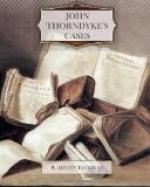I got down at the front gate, leaving the coachman to take the dogcart round, and walked up the drive; and my astonishment may be imagined when, on turning the corner, I came suddenly upon the inspector of the local police in earnest conversation with no less a person than John Thorndyke.
“What on earth has brought you here?” I exclaimed, my surprise getting the better of my manners.
“The ultimate motive-force,” he replied, “was an impulsive lady named Mrs. Haldean. She telegraphed for me—in your name.”
“She oughtn’t to have done that,” I said.
“Perhaps not. But the ethics of an agitated woman are not worth discussing, and she has done something much worse—she has applied to the local J.P. (a retired Major-General), and our gallant and unlearned friend has issued a warrant for the arrest of Lucy Haldean on the charge of murder.”
“But there has been no murder!” I exclaimed.
“That,” said Thorndyke, “is a legal subtlety that he does not appreciate. He has learned his law in the orderly-room, where the qualifications to practise are an irritable temper and a loud voice. However, the practical point is, inspector, that the warrant is irregular. You can’t arrest people for hypothetical crimes.”
The officer drew a deep breath of relief. He knew all about the irregularity, and now joyfully took refuge behind Thorndyke’s great reputation.
When he had departed—with a brief note from my colleague to the General—Thorndyke slipped his arm through mine, and we strolled towards the house.
“This is a grim business, Jervis,” said he. “That boy has got to be found for everybody’s sake. Can you come with me when you have had some food?”
“Of course I can. I have been saving myself all the afternoon with a view to continuing the search.”
“Good,” said Thorndyke. “Then come in and feed.”
A nondescript meal, half tea and half dinner, was already prepared, and Mrs. Hanshaw, grave but self-possessed, presided at the table.
“Mabel is still out with Giles, searching for the boy,” she said. “You have heard what she has done!”
I nodded.
“It was dreadful of her,” continued Mrs. Hanshaw, “but she is half mad, poor thing. You might run up and say a few kind words to poor Lucy while I make the tea.”
I went up at once and knocked at Miss Haldean’s door, and, being bidden to enter, found her lying on the sofa, red-eyed and pale, the very ghost of the merry, laughing girl who had gone out with me in the morning. I drew up a chair, and sat down by her side, and as I took the hand she held out to me, she said:
“It is good of you to come and see a miserable wretch like me. And Jane has been so sweet to me, Dr. Jervis; but Aunt Mabel thinks I have killed Freddy—you know she does—and it was really my fault that he was lost. I shall never forgive myself!”




